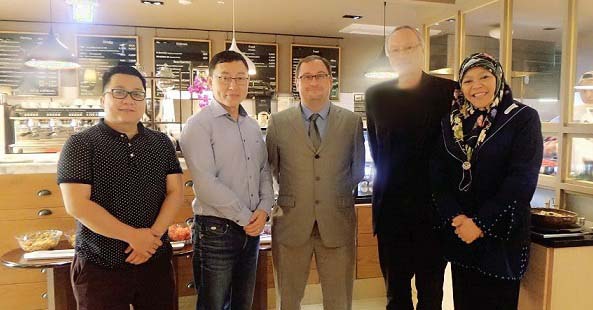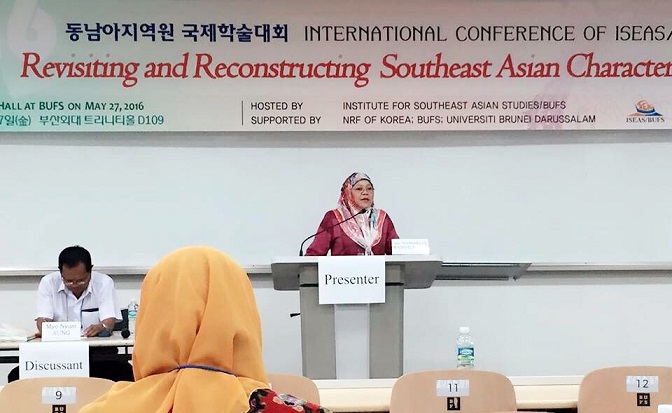2016 International Conference of ISEAS/BUFS, South Korea
On 27 May 2016, Dr Siti Norkhalbi, AP Dr Noor Azam, Dr Asiyah az-Zahra and Dr Rommel Curaming from FASS attended the 2016 International Conference of Institute for Southeast Asian Studies (ISEAS) and Busan University of Foreign Studies (BUFS) in South Korea.

BUFS Campus where the conference was held
The conference, with the theme ‘Revisiting and Reconstructing Southeast Asian Characteristics”, saw the participation of more than 40 researchers and experts on wide range of areas such as politics, history, gender, culture, ASEAN, education, material culture, border development, identity, nation-building, postcolonial nationalism and linguistics. The keynote speech was delivered by Prof. Victor T. King of University of Leeds and a former Visiting Professor of FASS, UBD. He spoke about the problem of defining Southeast Asia and suggested a more thorough engagement with the twin concepts of culture and identity to researchers to address different scales, levels and kinds of identity and the shifting and fluid nature of how local communities identify themselves.

UBD academics with Prof Kim Yekyoum of ISEAS, BUFS and Prof Victor T. King during the Welcoming Dinner

UBD academics with Prof Kim Yekyoum of ISEAS, BUFS
Dr Norkhalbi, AP DR Noor Azam and Dr Asiyah az-Zahra presented their papers on a special Brunei Panel: Identity, Traditions and Transformation.
Dr Siti Norkhalbi’s presentation, “Reflections of Brunei Characteristics through weaving traditions”, discussed the consumption and production of traditional textile that significantly reflect religious identity, social hierarchy and social values of the Bruneians which ultimately based on the national concept, Malay Islamic Monarchy.

Dr Siti Norkhalbi presenting her paper “Reflections of Brunei Characteristics through weaving traditions”
AP Dr Noor Azam’s paper on “Bilingualism and Bruneian Identity” argued how bilinguality could be used to define a Bruneian especially since the various indigenous groups of Brunei used to speak their own traditional languages, but eventually they learned to speak the language of the politically dominant Malays. Bilinguality became a norm, but the introduction of English-medium schools in the 1970s began to sow the seeds of a different kind of bilingualism, encouraged by language shift processes among ethnic minority groups.

AP Dr Noor Azam presenting his paper “Bilingualism and Bruneian Identity”
For her part, Dr Asiyah in her paper, “Defining the Dusun identity in Brunei”, explored the definition of ethnic identity of the Dusuns in Brunei from the perspectives of ‘everyday-defined’ social reality and argued that the core components of ethnic identity all exist and evolve in the life experiences of the Dusuns. The paper also identified family and historical contexts as the influential factors that shape the ways the informants experienced the ethnic identity components.

Dr Asiyah az-Zahra presenting her paper “Defining the Dusun identity in Brunei”
In a parallel session on Epistemic and Methodological issues on South East Asia, Dr Rommel Curaming presented his paper titled “On the Viability of Decolonized/Indigenous Methodologies: Implications for Southeast Asian Studies”. His paper assessed in preliminary manner the viability of a decolonized or indigenous methodology by using two cases, Kaupapa Maori Research and Sikolohiyang Pilipino. Dr Rommel argued that it is not epistemological and methodological issues that pose as hindrance, but a number of essential features of scholarly enterprise as it is currently operative, reinforced by the broad-based application of the logic of neo-liberal political economic order, that pose the most formidable challenge to the viability of indigenization efforts.

Dr Rommel Curaming presenting his paper “On the Viability of Decolonized/Indigenous Methodologies: Implications for Southeast Asian Studies”
Also attending the conference were Dr Mikio Oishi from Academy of Brunei Studies and Dr Frank Dhont from Institute of Asian Studies.
Last year, a Memorandum of Understanding (MOU) for cooperation was signed between FASS and Institute for Southeast Asian Studies (ISEAS) of BUFS. It aims to facilitate joint scholarly undertakings between the two institutions. In this conference, for instance, FASS, UBD served as one of the official supporters. Also, Dr. Rommel Curaming of History & International Studies Programme has been invited as a Visiting Scholar at the ISEAS from 27 May to 23 June 2016. More cooperative endeavours are in line for the near future.
